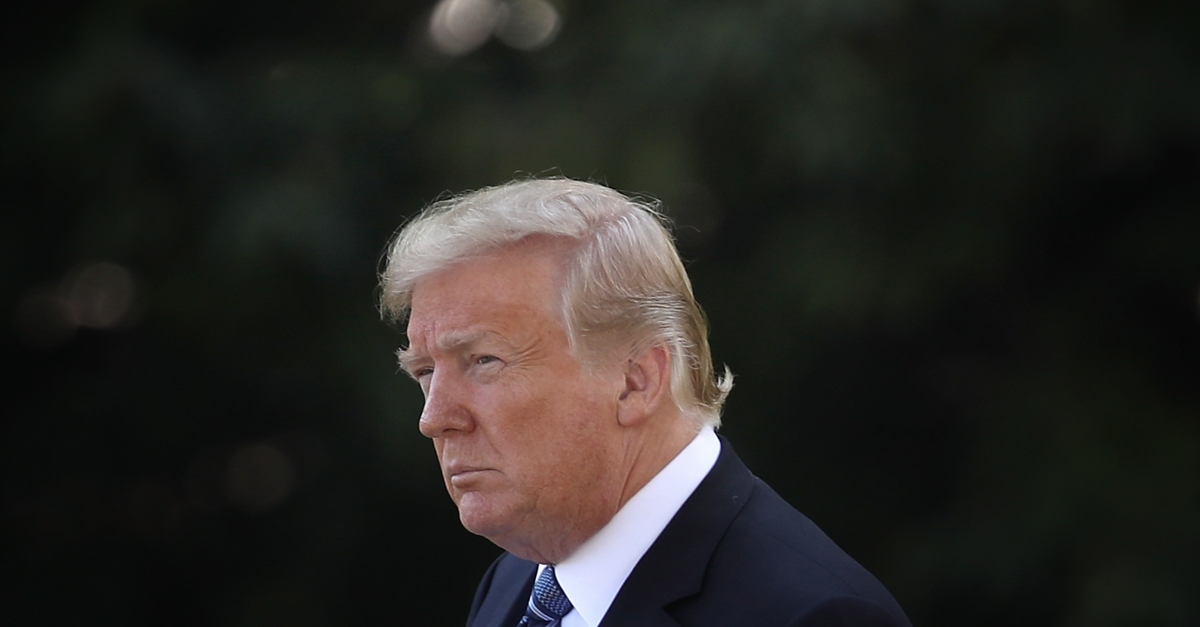
A law professor suggested on Sunday that President Donald Trump risks stepping over the line by promising to review the murder case of Army Major Matt Golsteyn.
The Uniform Code of Military Justice expressly forbids “Unlawful Command Influence,” including any attempt by someone in the chain of command “to influence the action of any convening, approving, or reviewing authority with respect to his judicial acts.”https://t.co/vlJlttggWe https://t.co/Pu6jvjFRXM
— Steve Vladeck (@steve_vladeck) December 16, 2018
Golsteyn was charged with murder in the 2010 death of an Afghan man, an Army spokesman announced. The alleged victim was suspected of making bombs for the Taliban.
University of Texas Law Professor and national security law expert Steve Vladeck, who has previously commented on Trump-related legal military matters, said that the Uniform Code of Military Justice prohibits “unlawful command influence.”
He explained why Trump’s tweet is problematic.
“Any time a President expresses an opinion about a specific pending military prosecution, he is coming dangerously close to UCI because he’s creating at least the appearance that those who depend upon his good graces for promotion and career advancement might prioritize his preferences over what the law requires,” he told Law&Crime in an email. Vladeck said that it could be a huge problem under the Uniform Code of Military Justice were Trump to influence the Golsteyn proceedings in a way that created any prejudice to the defendant.
A military judge in Hawaii ruled in 2013 that then-President Barack Obama committed unlawful command influence by calling for stiffer penalties for sexual assault convictions. Accordingly, the court decided that two defendants could not be punitively discharges if found guilty.
Conservative lawyer Robert Barnes, who has written columns for Law&Crime in the past, called Vladeck out for his tweet, and pointed out the pardon power.
Law professor forgets about pardon power. https://t.co/GxtdSc06U6
— Robert Barnes (@Barnes_Law) December 16, 2018
It wouldn’t be a huge surprise if Trump granted clemency to Golsteyn. His list of pardons and commutations are loaded with defendants who, if not considered his political allies, caught his personal attention. That includes Ex-Navy Sailor Kristian Saucier, late heavyweight boxer Jack Johnson, and Alice Marie Johnson.
Vladeck shot back at Barnes.
“Superficial commentator mistakes the pardon power for absolute discretion on the President’s power to interfere in ongoing military criminal cases even without issuing a pardon,” he wrote.
Law&Crime reached out to Barnes for his take on the Twitter exchange, and his understanding of the UCI statute.
He argued that Vladeck jumped to the conclusion that Trump’s tweet meant something besides pardon review.
“I saw no reason to do so,” he wrote Law&Crime in an email. “Even if it did, it is doubtful the rule applies when the intervention is on behalf of the accused. It is still an open question how it applies to Presidential comments in general, stemming from the criticism a few military judges had about Obama comments a few years back (where very few legal analysts took the position then they are taking now, as TDS [Trump derangement syndrome] spreads & infects the law profession.) Also, see Dershowitz comments on this in like context of the Comey obstruction theory — his point is anologous here, namely that the pardon power makes it impossible to obstruct by requesting leniency, as the request is merely the extension of his discretionary power.”
[Image via Win McNamee/Getty Images]